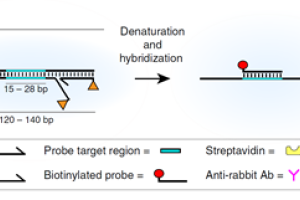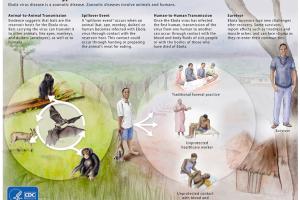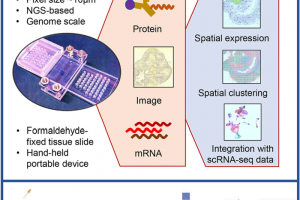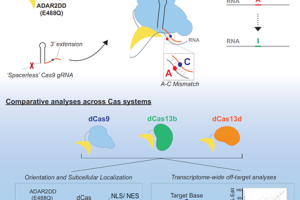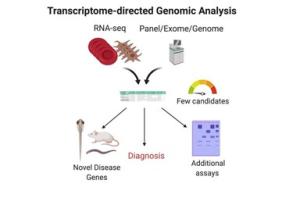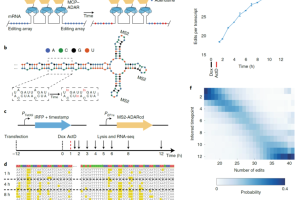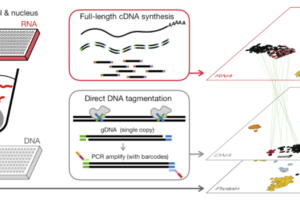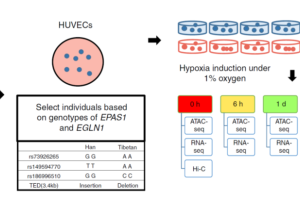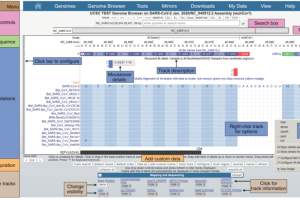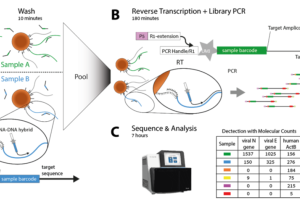- R&D
- Clinical Diagnosis
- News
- Company
QuickBiology News
News Center
Here are relevant industry news and updates on our company
COVID-19 cases continue to rise across countries. Researchers at Harvard Medical School and Broad Institute recently has developed new COVID-19 tests called eRPA (enhanced Recombinase Polymerase Amplification) and SHINE (SHERLOCK and HUDSON Integration to Navigate Epidemics), two complementary diagnostic platforms that deliver accurate results with minimal equipment. Read More
Ebola virus was first discovered in 1976, it has been infecting people, leading to outbreaks in several African countries. Ebola Virus Disease (EVD) is a rare and deadly zoonotic disease in human and non-human primates. Understanding the virus life cycle (e.g. host preferences/transmission, virus survival rate/stability in certain environments) helps us prevent infection. Understanding virus-host cell interaction can be the key to novel therapeutics or vaccines.Read More
In recent years, single-cell transcriptome sequencing technology has provided powerful tools for solving key biomedical problems. Although the single-cell transcriptome solves the problem of cell heterogeneity, it cannot restore its specific spatial location, and it is impossible to accurately explore cell functions. Spatial transcriptomics can fill this gap. Using spatial transcriptome technology, researchers can locate the gene expression information of cells in the tissue to the original spatial position of the tissue, thereby analyzing the differences in the function and gene expression of different parts of the tissue.Read More
CRISPR is a promising tool for correcting genetic defects to prevent or cure genetic disease. However, gene therapy targeting DNA is irreversible, is potentially damaging to germline cells. Therefore, it has been of great interest to target RNA in somatic cells while avoiding permanent off-target genomic edits.Read More
Next-generation sequencing (NGS) has changed diagnostic workflows and provided an unprecedented, simple way of discovering rare genomic diseases (QB News). Through whole genome sequencing (WGS) or whole exome sequencing (WES), scientists can trace genetic defects to mutations in a single gene. However, as only ~ 1% of the human genome is the coding region, many polymorphisms discovered from patients remain undiagnosed, and such genomic screening diagnostic rates are only 25-30%.Read More
We discussed methods that figure out spatial (location) and temporal resolution in single-cell RNA profiling. ScNT-seq (single-cell metabolically labeled new RNA tagging sequencing) developed by Wu’s Lab as we discussed before, only gives information of newly synthesized transcripts, it lacks the time scale about dynamics of gene expression. To build up a picture of the transcriptional history of a single cell, In Nature Biotechnology, Young scientist Fei Chen at Broad Institute developed RNA timestamps approach for inferring the age of individuals RNAs in RNA profiling by exploiting RNA editing.Read More
Single-cell sequencing is a great method to study cell heterogeneity, track cell lineages. In previous NGS news, we have introduced methods for instances, researchers perform tissue staining combing laser capture microdissection in Geo-seq (Geographical position sequencing) or in situ sequencing in tissue slide sections (slide-seq) to get spatial information of single cells or use metabolically labeled new RNA tagging sequencing to get time-resolved transcripts of single cells. Read More
Cellular hypoxia (low oxygen) is a stress common in the pathological processes, such as cancers (tumor hypoxia), ischemia (ischemic hypoxia), and preeclampsia (placental hypoxia). It affects cell metabolism, apoptosis, proliferation, and differentiation. Importantly, hypoxia in the Tumor Microenvironment (TME) is the negative factor in the efficacy of radio- and chemotherapy, which becomes a big barrier in cancer treatment. Read More
Since the first case of COVID-19 was reported in Dec 2019, a large amount of SARS-CoV-2 strains have been fully sequenced, transcriptome is also being functionally annotated. Such an explosion of omics data of SARS-CoV2 has created a need for storing, analyzing, comparing these data. Read More
Countries across Europe especially France, the UK, and Poland are seeing a resurgence in COVID-19 cases, are likely dealing with the much-feared second wave of SARs-CoV2 recently. Quick Biology previously summarized three methods which used next generation sequencing, to do high throughput diagnostics.
Most of these amplicon NGS libraries are based on RNA extraction followed by PCR; LAMP-seq, although getting rid of RNA extractions, combining isothermal nucleic acid amplification, its dynamic range/quantitative measure is still under evaluation (see News in Quick Biology).
Read More
Most of these amplicon NGS libraries are based on RNA extraction followed by PCR; LAMP-seq, although getting rid of RNA extractions, combining isothermal nucleic acid amplification, its dynamic range/quantitative measure is still under evaluation (see News in Quick Biology).
Read More








